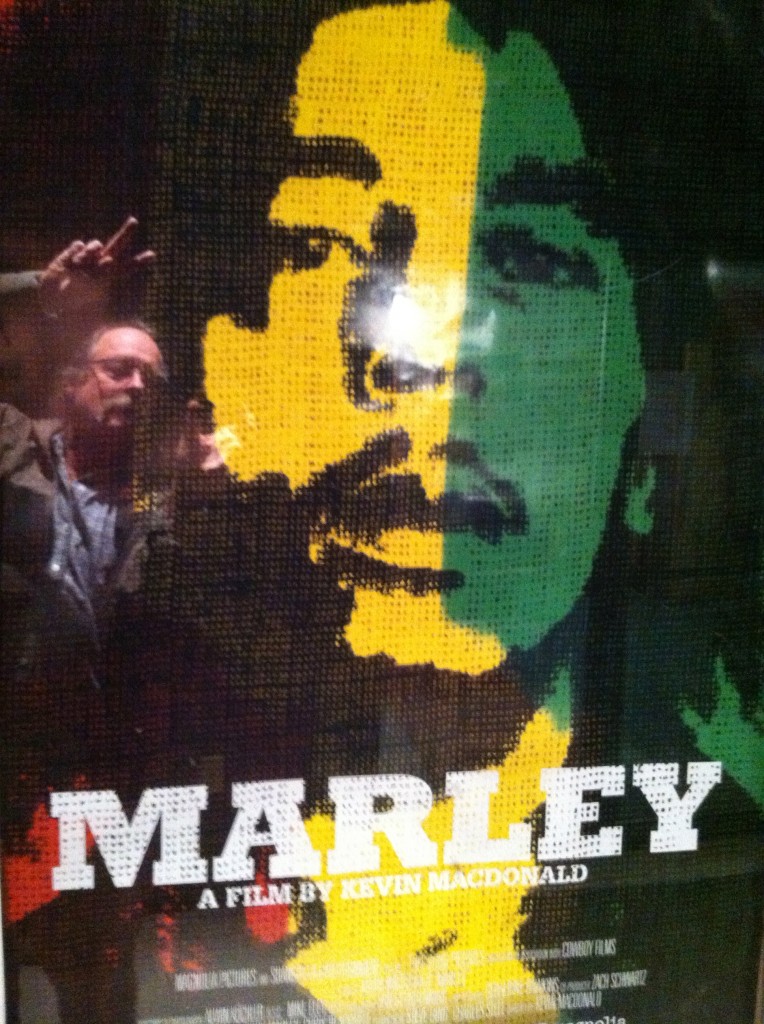Movie Night: Marley. Bob, not the Dog.
categories: Cocktail Hour / Movies
Comments Off on Movie Night: Marley. Bob, not the Dog.
.
Up and to Waterville the other night to see Marley, the new documentary of Bob Marley by filmmaker Kevin McDonald. It’s great. If you adore Bob Marley, go see it. If you don’t love him, go see it. If you think you hate him, go see it. If you don’t know him, go see it. It’s not a concert film though there is a lot of tantalizing footage of shows from across the Marley years and around the word. But at heart, this movie is a biography, maybe a bit of a hagiography, even, but still great. How pleasing to see Bob Marley’s mother in her colorful home, like a queen holding forth from her throne. How fascinating to learn she left him on his own in Trenchtown and moved to New Jersey when he was seventeen and already playing music with the local kids, who would soon be the Wailers and part of one of the great irruptions of genius the world seems to produce in certain times and certain places. And to see his father, an Englishman astride a horse, Marley himself, father to large numbers of Jamaican children, so it seems. Bob for his part fathered 11 kids with seven women, only two of them with Rita, who tells us their living and love arrangements were no one’s business, and that her job was to get the women out of his dressing room, end of a night. We meet their beautiful, pained daughter, Cedella, with her educated American accents, and get to look in on son Ziggy, pure Trenchtown. And other relatives, producers, side men, and stars, including Bunny himself, dissembling away, all of them, but charming, lots of new information, lots of surprises. Miss World 1976? Marley’s long-term girlfriend, still a beauty, lots to say. Shots of Trenchtown in Kingston are heartbreaking in some ways, cheering in others, a colorful panoply, but devastation, too. The house our man grew up in? A tin shack. The house he ended up in? A mansion two doors down from the prime minister’s, stuffed with friends and musicians and women and hangers on, the place he was shot and survived. Remember that? Marley shot? Who did it? Still a mystery. Thuggery, druggery, love and religion, that nutty religion, Rastafarianism, as fanciful as Mormonism, its own brand of fundamentalism, the worship of Hailie Selassie, who rejected his adorers.
Once riding my bike home from a construction job in New York City I saw a stretch limousine pull up in front of Memorial Sloan Kettering Hospital, followed by police cars. Numerous bodyguards leapt out and I stopped to watch–who could it be?–it was Bob Marley, weak and helpless and helped into a wheelchair. He’d collapsed in Central Park, I saw later on the news. And later yet that he had cancer.
This is a sad movie in many ways. Sad about cancer, sad about death, sad about the damage famous parents cause, sad about poverty, sad about friendships, sad about business, sad about drugs, sad about religion, sad mostly about a guy who died at 36 and was one of the great musical minds in the history of the world. I cried throughout. It makes me cry to think of it now, sad. But there’s joy there too, joy to go with all the memories of every song and all the visions those songs call up, all the friends, all the parties, all the dancing, all the singing along.
I still love him.


